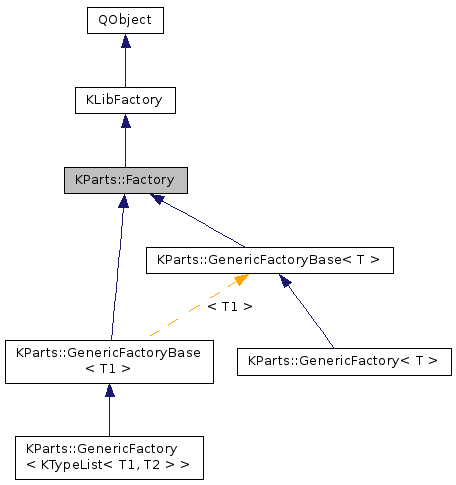KParts
#include <factory.h>

Public Member Functions | |
| Factory (QObject *parent=0) | |
| virtual | ~Factory () |
| Part * | createPart (QWidget *parentWidget=0, QObject *parent=0, const char *classname="KParts::Part", const QStringList &args=QStringList()) |
| virtual KComponentData | partComponentData () |
Static Public Member Functions | |
| static KComponentData | partComponentDataFromLibrary (const QString &libraryName) |
Protected Member Functions | |
| virtual QObject * | createObject (QObject *parent=0, const char *classname="QObject", const QStringList &args=QStringList()) |
| virtual Part * | createPartObject (QWidget *parentWidget=0, QObject *parent=0, const char *classname="KParts::Part", const QStringList &args=QStringList())=0 |
Detailed Description
A generic factory object to create a Part.
Factory is an abstract class. Reimplement the createPartObject() method to give it functionality.
- See also
- KLibFactory.
Constructor & Destructor Documentation
| Factory::Factory | ( | QObject * | parent = 0 | ) |
Definition at line 35 of file factory.cpp.
|
virtual |
Definition at line 40 of file factory.cpp.
Member Function Documentation
|
protectedvirtual |
| Part * Factory::createPart | ( | QWidget * | parentWidget = 0, |
| QObject * | parent = 0, |
||
| const char * | classname = "KParts::Part", |
||
| const QStringList & | args = QStringList() |
||
| ) |
Creates a part.
The QStringList can be used to pass additional arguments to the part. If the part needs additional arguments, it should take them as name="value" pairs. This is the way additional arguments will get passed to the part from eg. khtml. You can for example emebed the part into HTML by using the following code:
This could result in a call to
- Returns
- the newly created part.
createPart() automatically emits a signal KLibFactory::objectCreated to tell the library about its newly created object. This is very important for reference counting, and allows unloading the library automatically once all its objects have been destroyed.
Definition at line 44 of file factory.cpp.
|
protectedpure virtual |
Reimplement this method in your implementation to create the Part.
The QStringList can be used to pass additional arguments to the part. If the part needs additional arguments, it should take them as name="value" pairs. This is the way additional arguments will get passed to the part from eg. khtml. You can for example emebed the part into HTML by using the following code:
This could result in a call to
- Returns
- the newly created part.
Implemented in KParts::GenericFactory< KTypeList< T1, T2 > >, and KParts::GenericFactory< T >.
Definition at line 70 of file factory.cpp.
|
virtual |
If you have a part contained in a shared library you might want to query for meta-information like the about-data, or the KComponentData in general.
If the part is exported using KParts::GenericFactory then this method will return the instance that belongs to the part without the need to instantiate the part component.
Reimplemented in KParts::GenericFactoryBase< T >, and KParts::GenericFactoryBase< T1 >.
Definition at line 52 of file factory.cpp.
|
static |
A convenience method for partComponentData that takes care of retrieving the factory for a given library name and calling partComponentData on it.
- Parameters
-
libraryName name of the library to query the instance from
Definition at line 57 of file factory.cpp.
The documentation for this class was generated from the following files:
Documentation copyright © 1996-2014 The KDE developers.
Generated on Tue Oct 14 2014 22:50:42 by doxygen 1.8.7 written by Dimitri van Heesch, © 1997-2006
KDE's Doxygen guidelines are available online.
 KDE API Reference
KDE API Reference